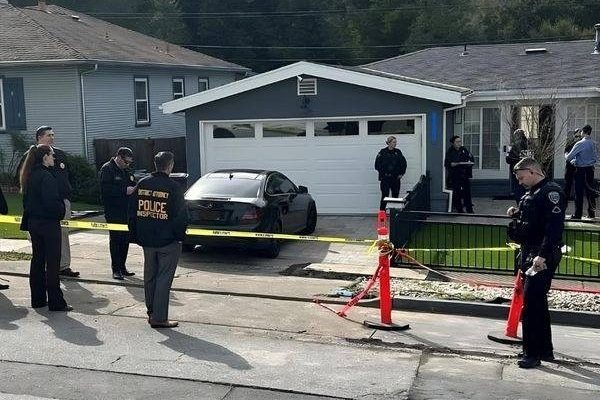Police Arrest Man Allegedly Linked to LA Wildfire Destroying 960 Acres
Tragic Wildfire Season in Los Angeles: Community Mourns and Seeks Answers
Los Angeles is currently battling an unprecedented wildfire crisis that has left a trail of devastation across multiple neighborhoods. These wildfires have resulted in the loss of lives, displaced thousands of residents, and destroyed countless homes. Among the numerous fires, the Kenneth Fire has garnered significant attention, with authorities suspecting it was intentionally ignited. Recently, a man was arrested in connection with this blaze, which has already consumed over 960 acres and continues to threaten more areas. This article explores the ongoing wildfire crisis, the arrest linked to the Kenneth Fire, the broader community impact, and the collective efforts to manage and mitigate the disaster.
Arrest Made in Connection with the Kenneth Fire
In a critical development amidst the wildfire chaos, local law enforcement officials have confirmed the arrest of a suspect believed to be responsible for igniting the Kenneth Fire. According to reports from The Independent, the individual was apprehended after being observed engaging in suspicious activities in the vicinity of the fire. Witnesses reported seeing the man riding a bicycle while carrying a large blowtorch, an unusual and alarming sight. He was reportedly attempting to set fire to trash bins and leftover Christmas trees in the area, actions that likely sparked the Kenneth Fire.
Concerned residents acted swiftly upon noticing the suspicious behavior. They detained the man, ensuring he could not flee the scene, until the Los Angeles Police Department (LAPD) arrived to formally arrest him. The Independent highlighted that the suspect’s deliberate actions may have directly contributed to the outbreak of the Kenneth Fire, categorizing the incident as arson rather than an accidental blaze.
The LAPD, in collaboration with the Los Angeles Fire Department (LAFD), is conducting a thorough investigation to determine the full extent of the suspect’s involvement and whether there are any accomplices or underlying motives behind the arson. The investigation includes analyzing surveillance footage, interviewing witnesses, and examining the burn patterns to confirm the intentional nature of the fire.
Escalating Wildfire Crisis in Southern California
The Kenneth Fire is just one of several massive wildfires currently devastating Southern California. Other significant blazes include the Palisade Fire, Eaton Fire, Hurst Fire, and Lidia Fire. Collectively, these wildfires have created an unprecedented emergency, claiming at least 10 lives and forcing thousands of residents to evacuate their homes in a matter of hours. Entire neighborhoods have been reduced to ashes, leaving a lasting scar on the affected communities.
The scale of the crisis has overwhelmed local emergency services, prompting the Los Angeles Fire Department (LAFD) to issue urgent calls for off-duty firefighters to return to duty. The sheer number of active fires has stretched emergency resources thin, making it difficult to contain the flames effectively. To aid in the evacuation efforts and ensure the safety of fleeing residents, bulldozers have been deployed to clear abandoned vehicles left behind in the chaos. However, the situation remains dire as gusty winds continue to exacerbate the spread of the fires, making containment efforts even more challenging.
The Devastating Role of Santa Ana Winds
A primary factor fueling the current wildfire crisis is the relentless Santa Ana winds, which have reached speeds of up to 100 mph. These powerful gusts have significantly accelerated the spread of the flames, transforming manageable fires into uncontrollable infernos within hours. The high winds have not only intensified the fires but also created additional hazards for both residents and firefighters.
One of the most immediate impacts of the Santa Ana winds has been the widespread power outages caused by downed power lines. Tens of thousands of homes have been left without electricity as utility companies struggle to manage the situation. In an effort to prevent further fires from igniting due to electrical faults, utility companies have preemptively shut off power to approximately 15,000 homes. This proactive measure, while necessary, has left many residents without essential services, adding to the hardship caused by the wildfires.
Firefighters describe the current conditions as some of the most challenging they have faced in years. The intense winds make it nearly impossible to contain the flames, forcing emergency crews to prioritize the protection of lives and critical infrastructure over battling the fires directly. The combination of high winds, dry vegetation, and multiple active fires has created a volatile situation that demands continuous and coordinated emergency response efforts.
Impact on the Community
The wildfires have inflicted widespread destruction, extending beyond the immediate physical damage to homes and properties. Families have been uprooted, losing not only their homes but also cherished possessions and a sense of security. The emotional toll on those affected is immense, as many residents grapple with the loss of their homes and the uncertainty of their futures.
Emergency shelters have been established across the region to provide refuge for displaced residents. These shelters offer basic necessities such as food, water, and temporary lodging, but they cannot replace the sense of home and community that has been shattered by the fires. The psychological impact of the wildfires is profound, with many residents experiencing anxiety, trauma, and grief in the aftermath of the disaster.
Local communities are banding together to support those affected by the wildfires. Volunteers are assisting with evacuation efforts, distributing supplies, and providing emotional support to displaced families. However, the sheer scale of the crisis has stretched resources to their limits, making it difficult to meet the overwhelming demand for assistance.
Heightened Vigilance and Community Response
The recent arrest related to the Kenneth Fire has heightened awareness and vigilance among Los Angeles residents. Authorities are urging the public to remain alert and report any suspicious activities as investigations into the other ongoing fires continue. The community’s proactive response in detaining the suspect demonstrates the collective effort to prevent further arson and protect the region from additional destruction.
Local authorities have emphasized the importance of community cooperation in managing the wildfire crisis. Neighbors are encouraged to look out for one another, especially the elderly and those with limited mobility, to ensure everyone remains safe during these challenging times. Additionally, residents are advised to stay informed through reliable sources such as the LAFD, LAPD, and local news outlets to receive timely updates and instructions.
Environmental and Economic Consequences
The wildfires have not only caused immediate destruction but also long-term environmental and economic consequences for Southern California. The burning of large areas of land has led to significant loss of vegetation, disrupting local ecosystems and wildlife habitats. The release of smoke and pollutants into the air has contributed to poor air quality, posing health risks to residents, especially those with respiratory conditions.
Economically, the wildfires have had a substantial impact on the region. The destruction of homes and businesses has led to significant financial losses for individuals and communities. The cost of firefighting efforts, emergency response, and rebuilding infrastructure has placed additional strain on local budgets. Insurance companies are grappling with the influx of claims, and many residents are facing challenges in securing the necessary funds to rebuild their lives
Moving Forward: Efforts to Combat the Fires
As the wildfires continue to rage, emergency crews are working tirelessly around the clock to contain the flames and support those affected. The coordination between the LAFD, LAPD, and other agencies is crucial in managing the crisis. Specialized firefighting units are being deployed to the most affected areas, utilizing advanced equipment and strategies to combat the rapidly spreading fires.
In addition to firefighting efforts, there is a strong focus on providing support to displaced residents. Temporary housing, financial assistance, and mental health services are being made available to help those who have lost their homes and are dealing with the emotional aftermath of the disaster. Community organizations and non-profits are playing a vital role in delivering these services, offering a lifeline to those in need.
The Path to Recovery and Prevention
In the wake of this devastating wildfire season, it is clear that California must prioritize strategies to prevent future disasters. This includes better land management, investment in firefighting resources, and community education on wildfire safety. Additionally, addressing the root causes of climate change is essential to reducing the frequency and intensity of such destructive fires.
Local governments and communities are also focusing on rebuilding and supporting those affected by the wildfires. Efforts are being made to restore damaged infrastructure, provide financial assistance to displaced families, and offer counseling services to help residents cope with the emotional aftermath of the fires.
Long-term recovery plans involve not only rebuilding homes and infrastructure but also restoring the natural environment. Reforestation projects and the restoration of wildlife habitats are essential components of the recovery process, helping to stabilize the ecosystem and prevent future wildfires from spreading as rapidly.
The Role of Technology and Innovation
Advancements in technology and innovation are playing a crucial role in combating the wildfire crisis in Southern California. Early detection systems, such as satellite monitoring and drone surveillance, are being utilized to identify and track wildfires in their nascent stages. These technologies enable firefighting teams to respond more quickly and effectively, potentially preventing small fires from becoming large-scale disasters.
Furthermore, innovative firefighting techniques and equipment are being deployed to enhance the effectiveness of emergency response efforts. Firefighters are being equipped with state-of-the-art gear and tools designed to withstand extreme conditions, ensuring they can operate safely and efficiently in the face of intense flames and high winds.
Community Resilience and Support
Amidst the devastation, stories of bravery and resilience are emerging, highlighting the strength of the Los Angeles community. Neighbors are helping neighbors, sharing resources, and providing emotional support to those in need. First responders, including firefighters, police officers, and medical personnel, are risking their lives to save others, demonstrating unwavering dedication and courage.
Community support extends beyond immediate assistance, with long-term initiatives aimed at fostering resilience and preparedness. Educational programs on wildfire safety, community drills, and the establishment of support networks are being implemented to ensure that residents are better equipped to handle future emergencies.
Environmental and Policy Reforms
The ongoing wildfire crisis has underscored the urgent need for environmental and policy reforms in California. Policymakers are advocating for comprehensive strategies to address the underlying factors contributing to the severity of wildfires. This includes stricter regulations on land use, enhanced building codes to make structures more fire-resistant, and increased funding for research on wildfire prevention and management.
Moreover, there is a push for greater collaboration between federal, state, and local agencies to develop integrated approaches to wildfire management. By pooling resources and expertise, these agencies can implement more effective strategies to mitigate the impact of wildfires and ensure a coordinated response during emergencies.
Public Awareness and Education
Public awareness and education are critical components in preventing future wildfires and minimizing their impact. Community outreach programs are being launched to educate residents about fire safety, evacuation procedures, and the importance of maintaining defensible space around properties. These programs aim to empower individuals with the knowledge and tools needed to protect themselves and their communities from wildfires.
Schools, community centers, and local organizations are partnering to deliver educational workshops, distribute informational materials, and conduct drills to ensure that residents are prepared for potential wildfire emergencies. By fostering a culture of preparedness and resilience, California can better withstand the challenges posed by wildfires.
The Importance of Mental Health Support
The emotional and psychological toll of the wildfire crisis cannot be overstated. Many residents are experiencing anxiety, trauma, and grief as they cope with the loss of their homes and the destruction of their communities. Providing mental health support is essential in helping individuals navigate the emotional aftermath of the disaster.
Counseling services, support groups, and mental health hotlines are being made available to offer assistance to those affected by the wildfires. Mental health professionals are working closely with community organizations to ensure that residents have access to the resources they need to heal and recover.
The Global Perspective
The wildfire crisis in Los Angeles is not an isolated incident but part of a broader global trend of increasing wildfire frequency and intensity. Climate change, urban expansion into wildland areas, and changing weather patterns are contributing to the rise in wildfires worldwide. Countries across the globe are grappling with similar challenges, highlighting the need for international cooperation and knowledge sharing in wildfire management.
Global initiatives aimed at combating climate change, improving land management practices, and investing in wildfire prevention technologies are essential in addressing the root causes of the crisis. By working together, nations can develop more effective strategies to mitigate the impact of wildfires and protect communities from future disasters.
Moving Forward: Building a Resilient Future
As the fires continue to rage, the focus remains on containing the flames, supporting those affected, and implementing measures to prevent future disasters. The wildfire crisis in Los Angeles serves as a stark reminder of the destructive power of nature and the urgent need for comprehensive strategies to address the challenges posed by wildfires.
By prioritizing preparedness, investing in firefighting resources, fostering community resilience, and addressing the root causes of climate change, California can hope to mitigate the impact of future wildfires and build a more resilient future for its communities. The collective efforts of residents, authorities, and organizations are crucial in navigating this crisis and ensuring that Southern California emerges stronger and more prepared for the challenges ahead.
Conclusion: A Community United in Crisis
The wildfire crisis in Los Angeles and the broader Southern California region is a testament to the destructive power of wildfires and the profound impact they have on communities. The recent arrest linked to the Kenneth Fire brings a sense of accountability amidst the chaos, but the road to recovery remains long and arduous.
As residents continue to navigate the challenges posed by the wildfires, the strength and solidarity of the community play a crucial role in overcoming this crisis. By coming together, supporting one another, and advocating for stronger preventive measures, California can hope to mitigate the impact of future wildfires and build a more resilient future for its communities.
In these trying times, the spirit of unity and resilience shines through, demonstrating that even in the face of overwhelming adversity, communities can come together to rebuild and support one another. The wildfire crisis underscores the importance of collective action, preparedness, and the unwavering determination to protect lives and preserve the communities that make Southern California unique.
References
1.The Independent – Arson suspect arrested in connection with Kenneth wildfire
2.Los Angeles Fire Department (LAFD) – Official statements and updates on current wildfires.
3.Los Angeles Police Department (LAPD) – Information on the arrest and ongoing investigation
4.California Department of Forestry and Fire Protection (CAL FIRE) – Data on wildfire statistics and prevention strategies
5.National Weather Service (NWS) – Reports on Santa Ana winds and their impact on wildfires.
6.Local News Outlets – Coverage of the wildfire crisis and community response efforts.
Additional Sources
•California Wildfire Mitigation Strategies – CAL FIRE
•Climate Change and Wildfires – Intergovernmental Panel on Climate Change (IPCC) Reports
•Mental Health Support for Wildfire Survivors – National Alliance on Mental Illness (NAMI)
In this comprehensive overview, we have explored the multifaceted impact of the ongoing wildfire crisis in Los Angeles, the arrest related to the Kenneth Fire, and the broader implications for the community and environment. By understanding the causes, effects, and responses to this disaster, we can better prepare for and mitigate the impact of future wildfires, ensuring the safety and resilience of our communities.




